Business Communication Report: Brit-tech Employee Office Return
VerifiedAdded on 2023/06/12
|10
|2071
|192
Report
AI Summary
This report examines Brit-tech's approach to business communication, focusing on strategies to encourage employees to return to the office after extended work-from-home arrangements. It discusses relevant organizational communication theories, including Weber's Classic Organizational Theory, Tompkins and Cheney's Organizational Control Theory, and Deetz's Managerialism Theory, and evaluates communication barriers such as physical, emotional, and perceptual challenges that have made employees hesitant to return. The report outlines Brit-tech's strategies for overcoming these barriers, including arranging transportation, motivating personnel, implementing COVID-19 protocols, and organizing awareness and vaccination programs. The conclusion highlights the importance of effective business communication for managerial efficiency, target achievement, and employee morale. Recommendations are provided to offer flexibility in work arrangements and revisit healthcare options to further encourage employees to return to the office.
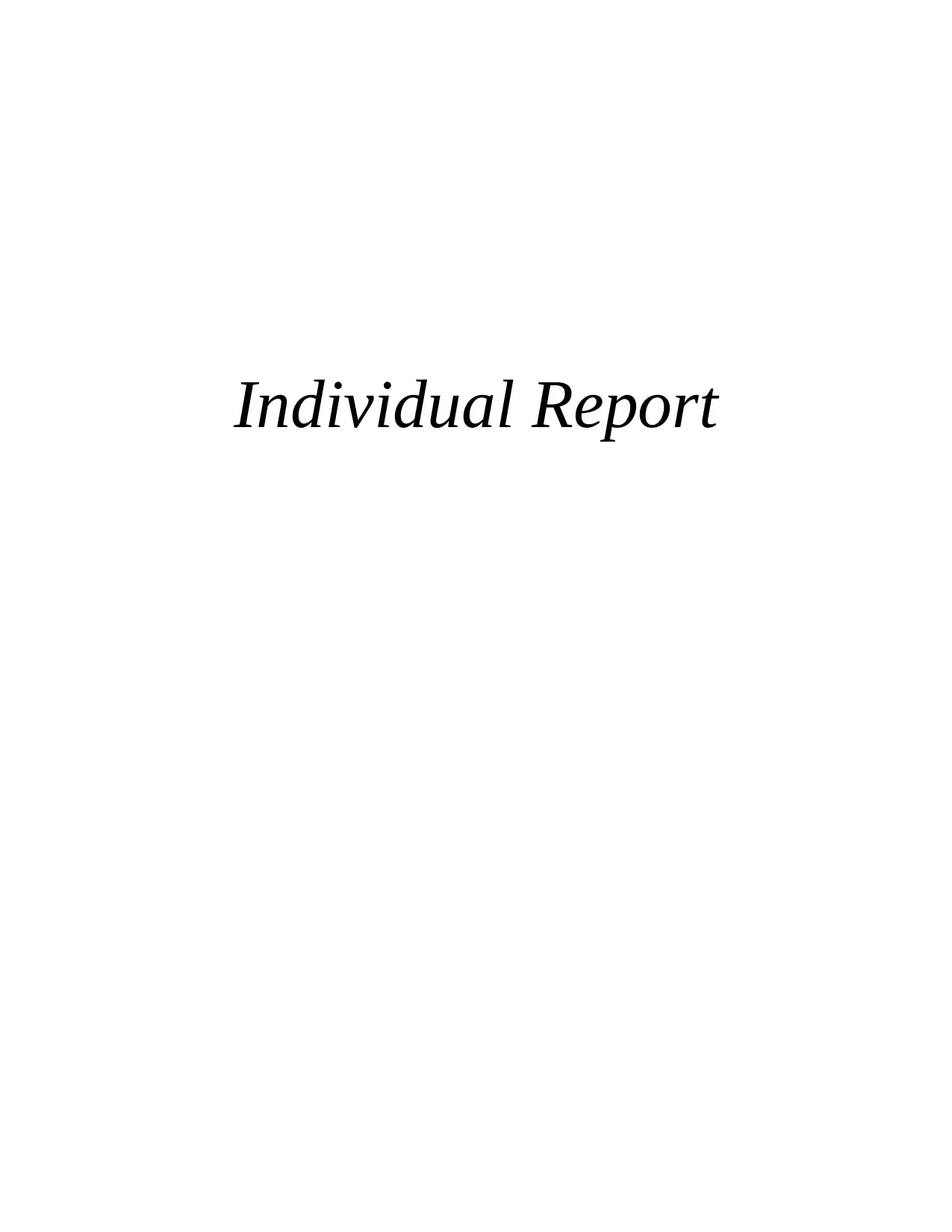
Individual Report
Paraphrase This Document
Need a fresh take? Get an instant paraphrase of this document with our AI Paraphraser
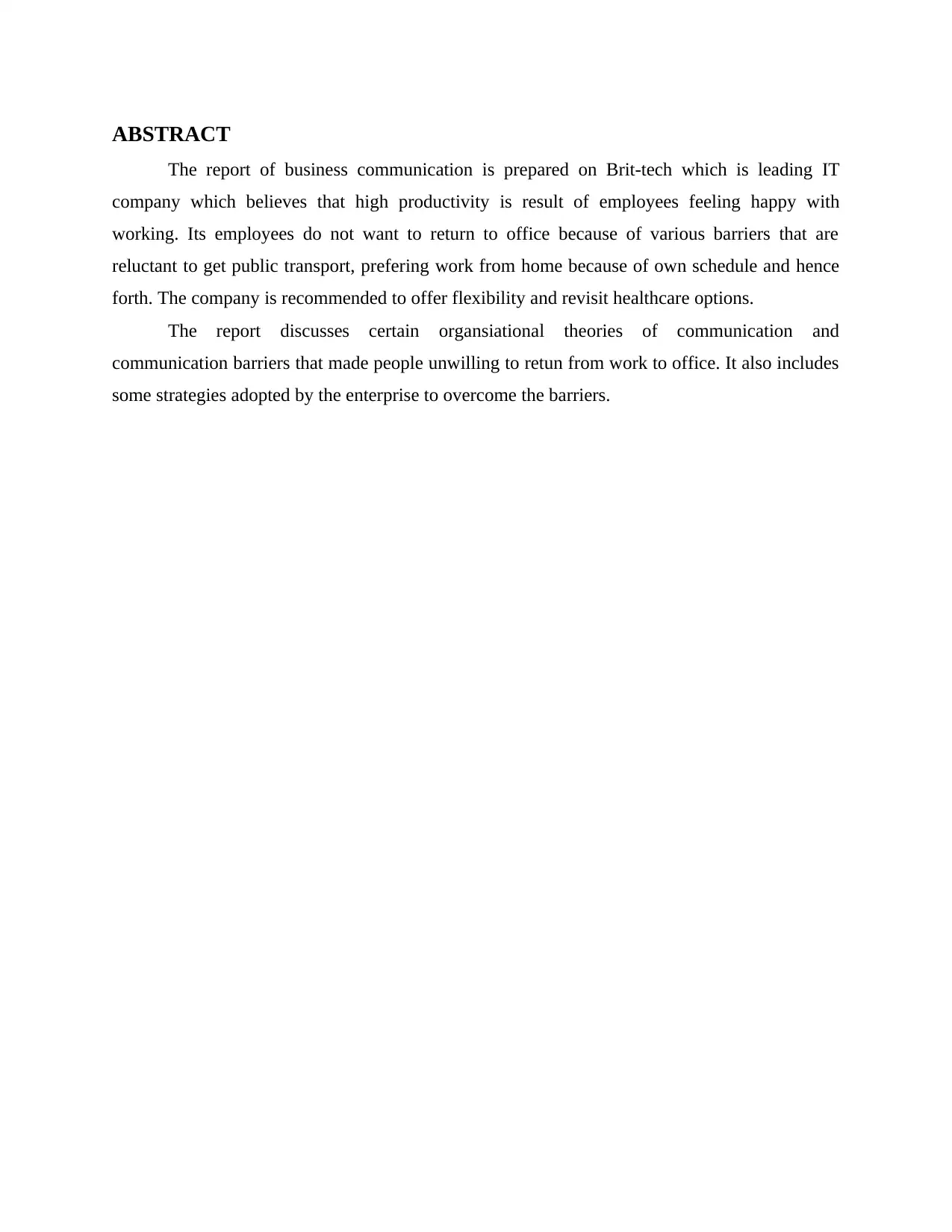
ABSTRACT
The report of business communication is prepared on Brit-tech which is leading IT
company which believes that high productivity is result of employees feeling happy with
working. Its employees do not want to return to office because of various barriers that are
reluctant to get public transport, prefering work from home because of own schedule and hence
forth. The company is recommended to offer flexibility and revisit healthcare options.
The report discusses certain organsiational theories of communication and
communication barriers that made people unwilling to retun from work to office. It also includes
some strategies adopted by the enterprise to overcome the barriers.
The report of business communication is prepared on Brit-tech which is leading IT
company which believes that high productivity is result of employees feeling happy with
working. Its employees do not want to return to office because of various barriers that are
reluctant to get public transport, prefering work from home because of own schedule and hence
forth. The company is recommended to offer flexibility and revisit healthcare options.
The report discusses certain organsiational theories of communication and
communication barriers that made people unwilling to retun from work to office. It also includes
some strategies adopted by the enterprise to overcome the barriers.
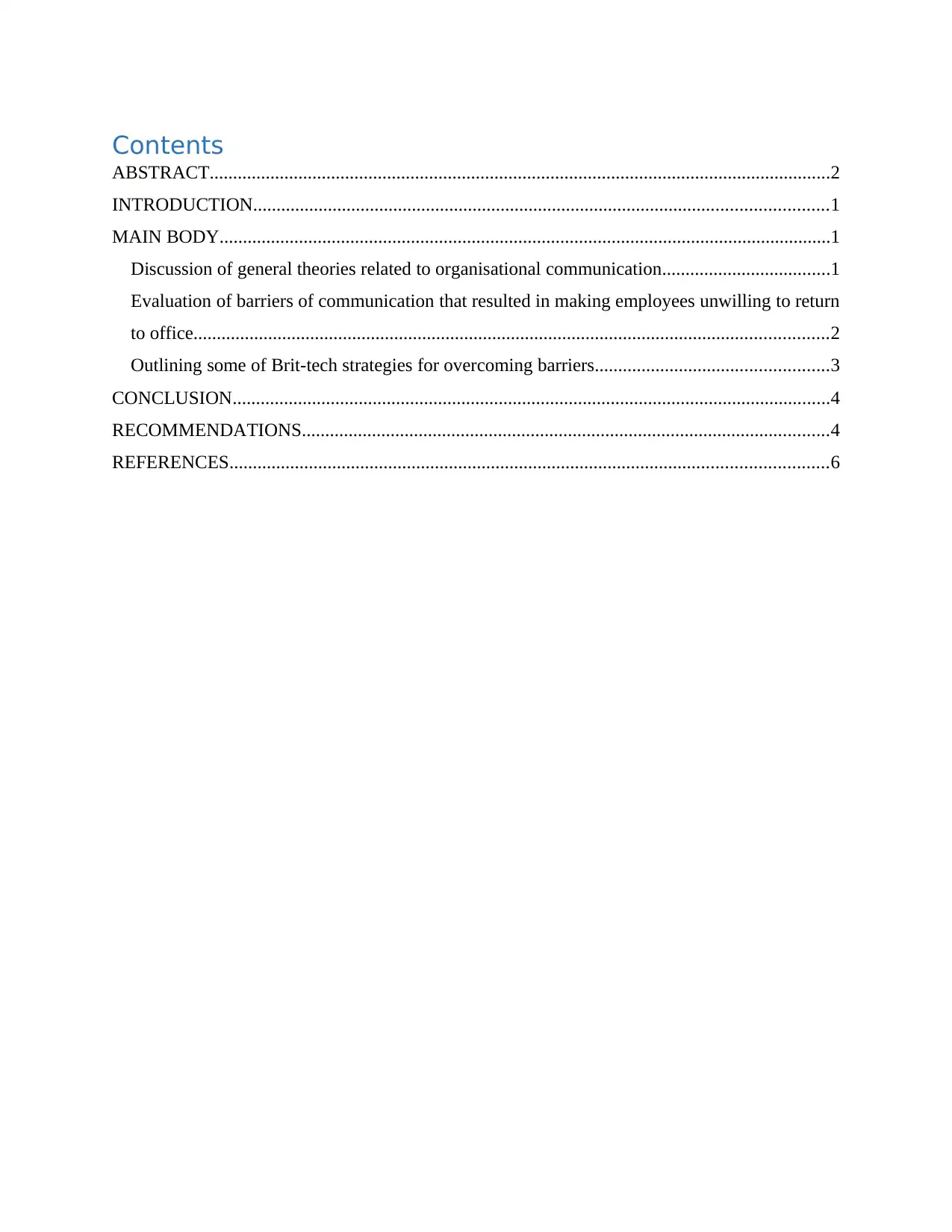
Contents
ABSTRACT.....................................................................................................................................2
INTRODUCTION...........................................................................................................................1
MAIN BODY...................................................................................................................................1
Discussion of general theories related to organisational communication....................................1
Evaluation of barriers of communication that resulted in making employees unwilling to return
to office........................................................................................................................................2
Outlining some of Brit-tech strategies for overcoming barriers..................................................3
CONCLUSION................................................................................................................................4
RECOMMENDATIONS.................................................................................................................4
REFERENCES................................................................................................................................6
ABSTRACT.....................................................................................................................................2
INTRODUCTION...........................................................................................................................1
MAIN BODY...................................................................................................................................1
Discussion of general theories related to organisational communication....................................1
Evaluation of barriers of communication that resulted in making employees unwilling to return
to office........................................................................................................................................2
Outlining some of Brit-tech strategies for overcoming barriers..................................................3
CONCLUSION................................................................................................................................4
RECOMMENDATIONS.................................................................................................................4
REFERENCES................................................................................................................................6
⊘ This is a preview!⊘
Do you want full access?
Subscribe today to unlock all pages.

Trusted by 1+ million students worldwide

Paraphrase This Document
Need a fresh take? Get an instant paraphrase of this document with our AI Paraphraser
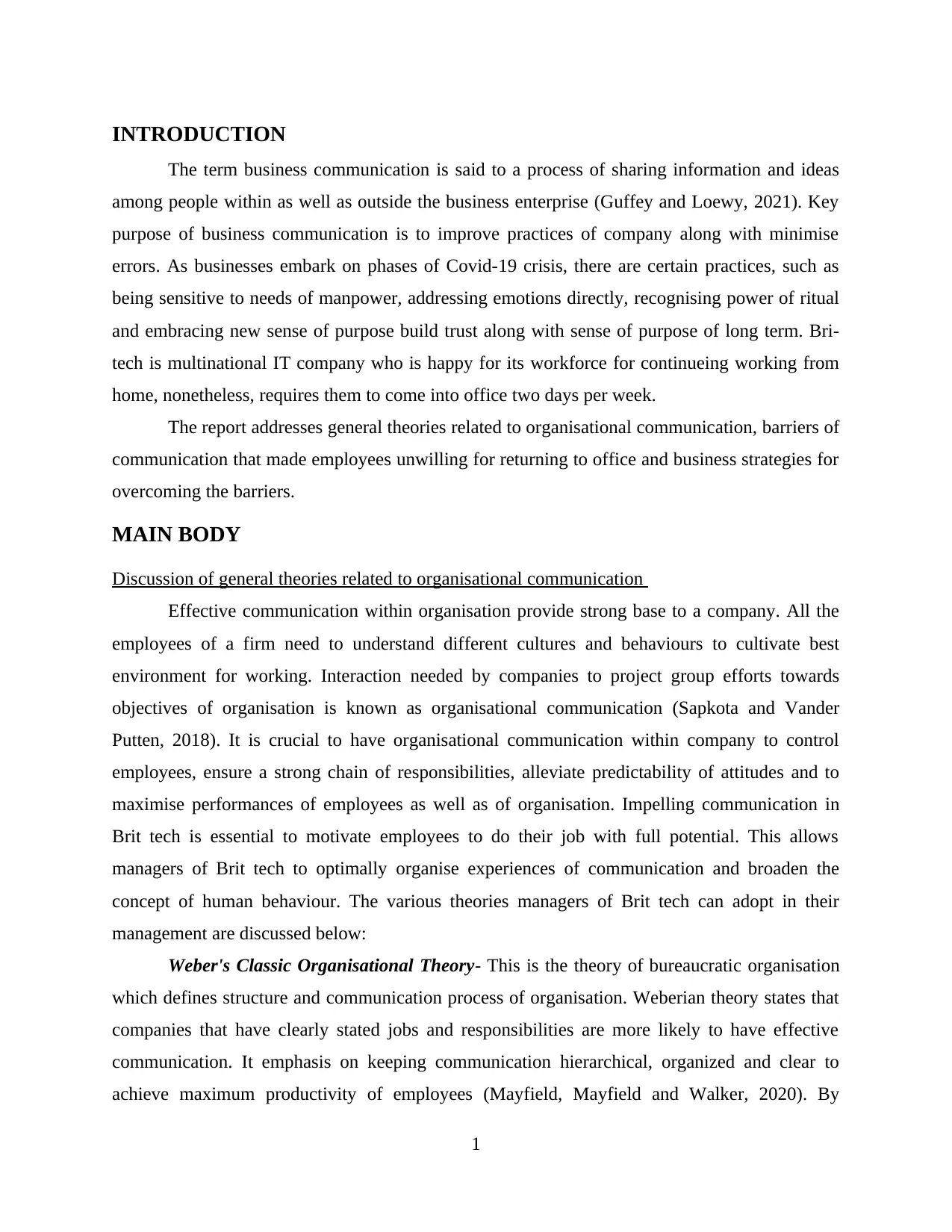
INTRODUCTION
The term business communication is said to a process of sharing information and ideas
among people within as well as outside the business enterprise (Guffey and Loewy, 2021). Key
purpose of business communication is to improve practices of company along with minimise
errors. As businesses embark on phases of Covid-19 crisis, there are certain practices, such as
being sensitive to needs of manpower, addressing emotions directly, recognising power of ritual
and embracing new sense of purpose build trust along with sense of purpose of long term. Bri-
tech is multinational IT company who is happy for its workforce for continueing working from
home, nonetheless, requires them to come into office two days per week.
The report addresses general theories related to organisational communication, barriers of
communication that made employees unwilling for returning to office and business strategies for
overcoming the barriers.
MAIN BODY
Discussion of general theories related to organisational communication
Effective communication within organisation provide strong base to a company. All the
employees of a firm need to understand different cultures and behaviours to cultivate best
environment for working. Interaction needed by companies to project group efforts towards
objectives of organisation is known as organisational communication (Sapkota and Vander
Putten, 2018). It is crucial to have organisational communication within company to control
employees, ensure a strong chain of responsibilities, alleviate predictability of attitudes and to
maximise performances of employees as well as of organisation. Impelling communication in
Brit tech is essential to motivate employees to do their job with full potential. This allows
managers of Brit tech to optimally organise experiences of communication and broaden the
concept of human behaviour. The various theories managers of Brit tech can adopt in their
management are discussed below:
Weber's Classic Organisational Theory- This is the theory of bureaucratic organisation
which defines structure and communication process of organisation. Weberian theory states that
companies that have clearly stated jobs and responsibilities are more likely to have effective
communication. It emphasis on keeping communication hierarchical, organized and clear to
achieve maximum productivity of employees (Mayfield, Mayfield and Walker, 2020). By
1
The term business communication is said to a process of sharing information and ideas
among people within as well as outside the business enterprise (Guffey and Loewy, 2021). Key
purpose of business communication is to improve practices of company along with minimise
errors. As businesses embark on phases of Covid-19 crisis, there are certain practices, such as
being sensitive to needs of manpower, addressing emotions directly, recognising power of ritual
and embracing new sense of purpose build trust along with sense of purpose of long term. Bri-
tech is multinational IT company who is happy for its workforce for continueing working from
home, nonetheless, requires them to come into office two days per week.
The report addresses general theories related to organisational communication, barriers of
communication that made employees unwilling for returning to office and business strategies for
overcoming the barriers.
MAIN BODY
Discussion of general theories related to organisational communication
Effective communication within organisation provide strong base to a company. All the
employees of a firm need to understand different cultures and behaviours to cultivate best
environment for working. Interaction needed by companies to project group efforts towards
objectives of organisation is known as organisational communication (Sapkota and Vander
Putten, 2018). It is crucial to have organisational communication within company to control
employees, ensure a strong chain of responsibilities, alleviate predictability of attitudes and to
maximise performances of employees as well as of organisation. Impelling communication in
Brit tech is essential to motivate employees to do their job with full potential. This allows
managers of Brit tech to optimally organise experiences of communication and broaden the
concept of human behaviour. The various theories managers of Brit tech can adopt in their
management are discussed below:
Weber's Classic Organisational Theory- This is the theory of bureaucratic organisation
which defines structure and communication process of organisation. Weberian theory states that
companies that have clearly stated jobs and responsibilities are more likely to have effective
communication. It emphasis on keeping communication hierarchical, organized and clear to
achieve maximum productivity of employees (Mayfield, Mayfield and Walker, 2020). By
1
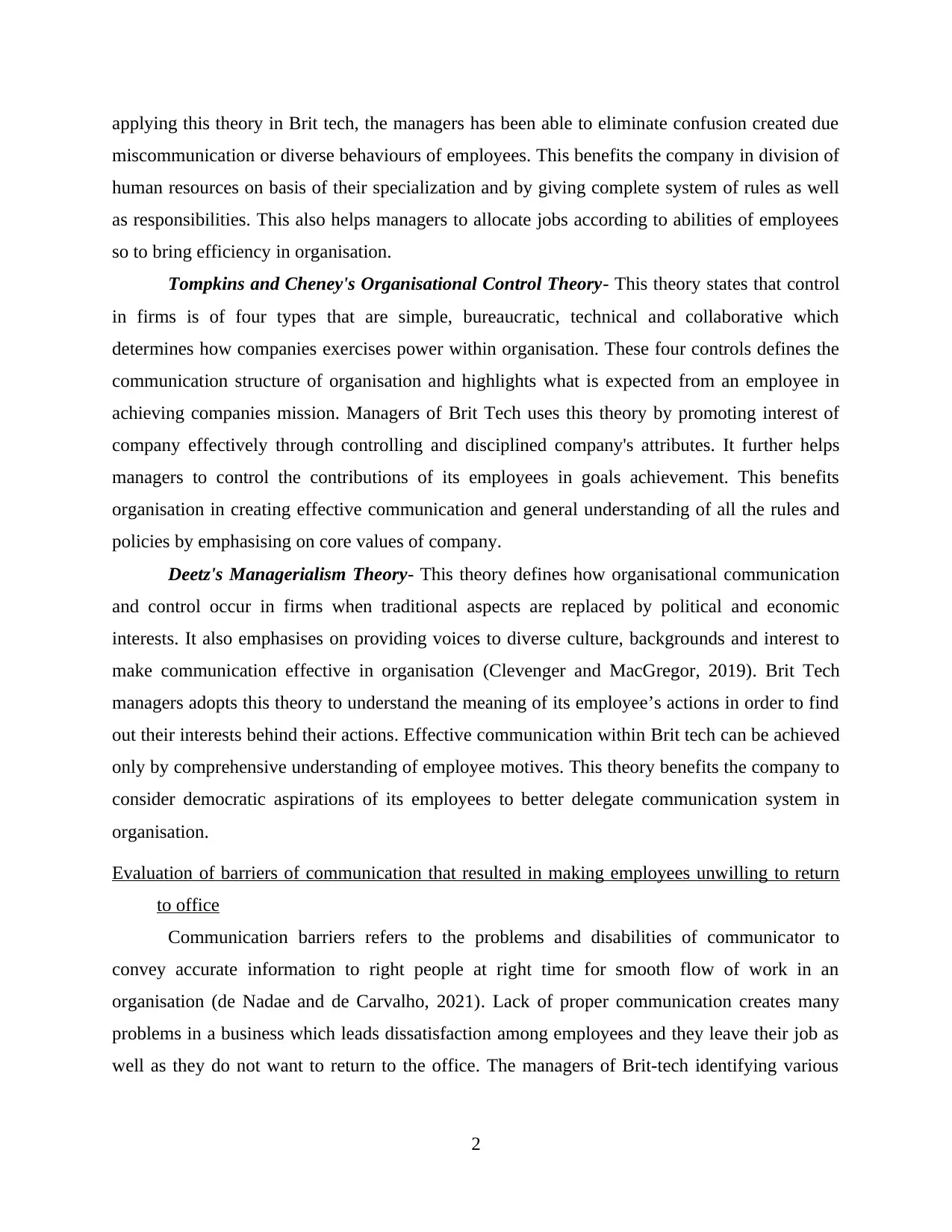
applying this theory in Brit tech, the managers has been able to eliminate confusion created due
miscommunication or diverse behaviours of employees. This benefits the company in division of
human resources on basis of their specialization and by giving complete system of rules as well
as responsibilities. This also helps managers to allocate jobs according to abilities of employees
so to bring efficiency in organisation.
Tompkins and Cheney's Organisational Control Theory- This theory states that control
in firms is of four types that are simple, bureaucratic, technical and collaborative which
determines how companies exercises power within organisation. These four controls defines the
communication structure of organisation and highlights what is expected from an employee in
achieving companies mission. Managers of Brit Tech uses this theory by promoting interest of
company effectively through controlling and disciplined company's attributes. It further helps
managers to control the contributions of its employees in goals achievement. This benefits
organisation in creating effective communication and general understanding of all the rules and
policies by emphasising on core values of company.
Deetz's Managerialism Theory- This theory defines how organisational communication
and control occur in firms when traditional aspects are replaced by political and economic
interests. It also emphasises on providing voices to diverse culture, backgrounds and interest to
make communication effective in organisation (Clevenger and MacGregor, 2019). Brit Tech
managers adopts this theory to understand the meaning of its employee’s actions in order to find
out their interests behind their actions. Effective communication within Brit tech can be achieved
only by comprehensive understanding of employee motives. This theory benefits the company to
consider democratic aspirations of its employees to better delegate communication system in
organisation.
Evaluation of barriers of communication that resulted in making employees unwilling to return
to office
Communication barriers refers to the problems and disabilities of communicator to
convey accurate information to right people at right time for smooth flow of work in an
organisation (de Nadae and de Carvalho, 2021). Lack of proper communication creates many
problems in a business which leads dissatisfaction among employees and they leave their job as
well as they do not want to return to the office. The managers of Brit-tech identifying various
2
miscommunication or diverse behaviours of employees. This benefits the company in division of
human resources on basis of their specialization and by giving complete system of rules as well
as responsibilities. This also helps managers to allocate jobs according to abilities of employees
so to bring efficiency in organisation.
Tompkins and Cheney's Organisational Control Theory- This theory states that control
in firms is of four types that are simple, bureaucratic, technical and collaborative which
determines how companies exercises power within organisation. These four controls defines the
communication structure of organisation and highlights what is expected from an employee in
achieving companies mission. Managers of Brit Tech uses this theory by promoting interest of
company effectively through controlling and disciplined company's attributes. It further helps
managers to control the contributions of its employees in goals achievement. This benefits
organisation in creating effective communication and general understanding of all the rules and
policies by emphasising on core values of company.
Deetz's Managerialism Theory- This theory defines how organisational communication
and control occur in firms when traditional aspects are replaced by political and economic
interests. It also emphasises on providing voices to diverse culture, backgrounds and interest to
make communication effective in organisation (Clevenger and MacGregor, 2019). Brit Tech
managers adopts this theory to understand the meaning of its employee’s actions in order to find
out their interests behind their actions. Effective communication within Brit tech can be achieved
only by comprehensive understanding of employee motives. This theory benefits the company to
consider democratic aspirations of its employees to better delegate communication system in
organisation.
Evaluation of barriers of communication that resulted in making employees unwilling to return
to office
Communication barriers refers to the problems and disabilities of communicator to
convey accurate information to right people at right time for smooth flow of work in an
organisation (de Nadae and de Carvalho, 2021). Lack of proper communication creates many
problems in a business which leads dissatisfaction among employees and they leave their job as
well as they do not want to return to the office. The managers of Brit-tech identifying various
2
⊘ This is a preview!⊘
Do you want full access?
Subscribe today to unlock all pages.

Trusted by 1+ million students worldwide
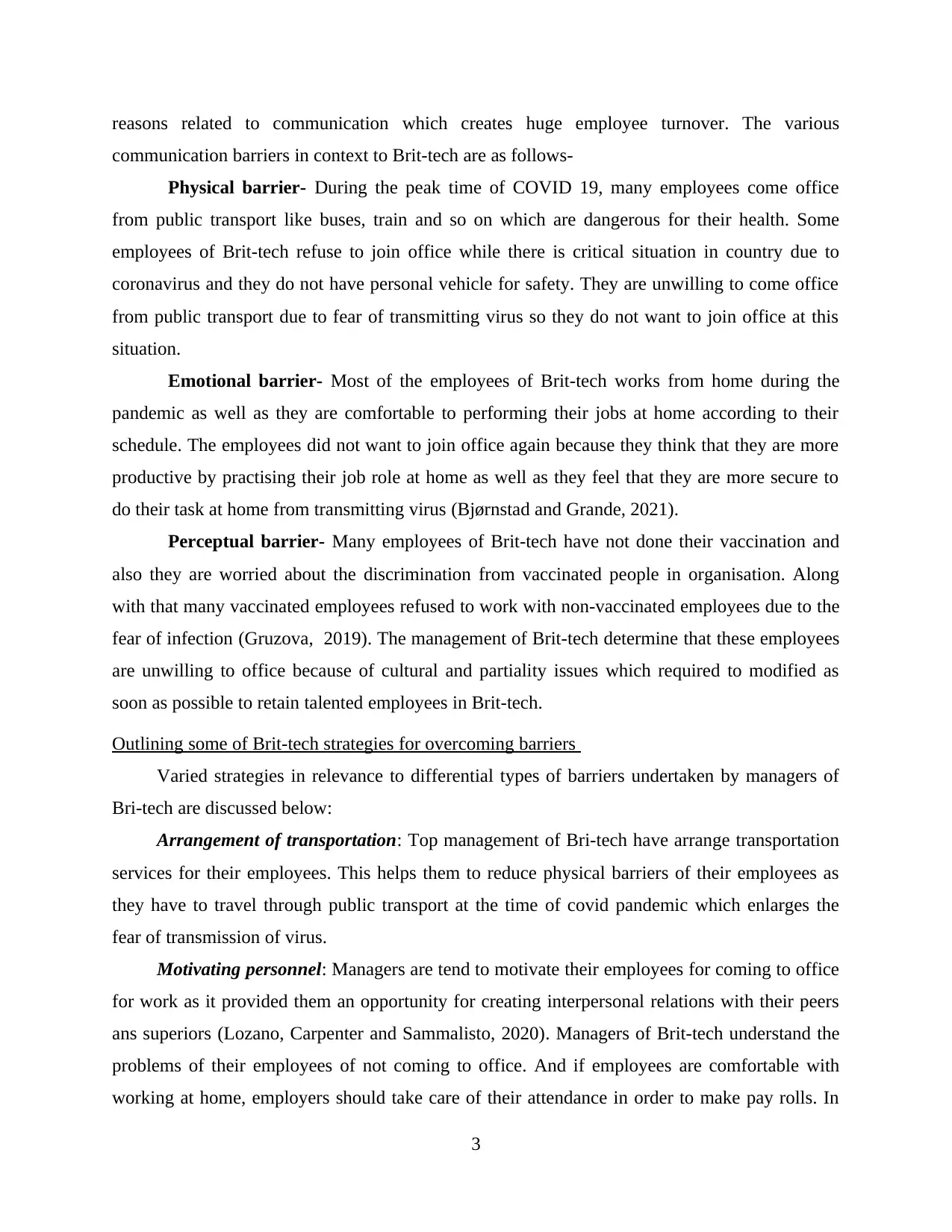
reasons related to communication which creates huge employee turnover. The various
communication barriers in context to Brit-tech are as follows-
Physical barrier- During the peak time of COVID 19, many employees come office
from public transport like buses, train and so on which are dangerous for their health. Some
employees of Brit-tech refuse to join office while there is critical situation in country due to
coronavirus and they do not have personal vehicle for safety. They are unwilling to come office
from public transport due to fear of transmitting virus so they do not want to join office at this
situation.
Emotional barrier- Most of the employees of Brit-tech works from home during the
pandemic as well as they are comfortable to performing their jobs at home according to their
schedule. The employees did not want to join office again because they think that they are more
productive by practising their job role at home as well as they feel that they are more secure to
do their task at home from transmitting virus (Bjørnstad and Grande, 2021).
Perceptual barrier- Many employees of Brit-tech have not done their vaccination and
also they are worried about the discrimination from vaccinated people in organisation. Along
with that many vaccinated employees refused to work with non-vaccinated employees due to the
fear of infection (Gruzova, 2019). The management of Brit-tech determine that these employees
are unwilling to office because of cultural and partiality issues which required to modified as
soon as possible to retain talented employees in Brit-tech.
Outlining some of Brit-tech strategies for overcoming barriers
Varied strategies in relevance to differential types of barriers undertaken by managers of
Bri-tech are discussed below:
Arrangement of transportation: Top management of Bri-tech have arrange transportation
services for their employees. This helps them to reduce physical barriers of their employees as
they have to travel through public transport at the time of covid pandemic which enlarges the
fear of transmission of virus.
Motivating personnel: Managers are tend to motivate their employees for coming to office
for work as it provided them an opportunity for creating interpersonal relations with their peers
ans superiors (Lozano, Carpenter and Sammalisto, 2020). Managers of Brit-tech understand the
problems of their employees of not coming to office. And if employees are comfortable with
working at home, employers should take care of their attendance in order to make pay rolls. In
3
communication barriers in context to Brit-tech are as follows-
Physical barrier- During the peak time of COVID 19, many employees come office
from public transport like buses, train and so on which are dangerous for their health. Some
employees of Brit-tech refuse to join office while there is critical situation in country due to
coronavirus and they do not have personal vehicle for safety. They are unwilling to come office
from public transport due to fear of transmitting virus so they do not want to join office at this
situation.
Emotional barrier- Most of the employees of Brit-tech works from home during the
pandemic as well as they are comfortable to performing their jobs at home according to their
schedule. The employees did not want to join office again because they think that they are more
productive by practising their job role at home as well as they feel that they are more secure to
do their task at home from transmitting virus (Bjørnstad and Grande, 2021).
Perceptual barrier- Many employees of Brit-tech have not done their vaccination and
also they are worried about the discrimination from vaccinated people in organisation. Along
with that many vaccinated employees refused to work with non-vaccinated employees due to the
fear of infection (Gruzova, 2019). The management of Brit-tech determine that these employees
are unwilling to office because of cultural and partiality issues which required to modified as
soon as possible to retain talented employees in Brit-tech.
Outlining some of Brit-tech strategies for overcoming barriers
Varied strategies in relevance to differential types of barriers undertaken by managers of
Bri-tech are discussed below:
Arrangement of transportation: Top management of Bri-tech have arrange transportation
services for their employees. This helps them to reduce physical barriers of their employees as
they have to travel through public transport at the time of covid pandemic which enlarges the
fear of transmission of virus.
Motivating personnel: Managers are tend to motivate their employees for coming to office
for work as it provided them an opportunity for creating interpersonal relations with their peers
ans superiors (Lozano, Carpenter and Sammalisto, 2020). Managers of Brit-tech understand the
problems of their employees of not coming to office. And if employees are comfortable with
working at home, employers should take care of their attendance in order to make pay rolls. In
3
Paraphrase This Document
Need a fresh take? Get an instant paraphrase of this document with our AI Paraphraser
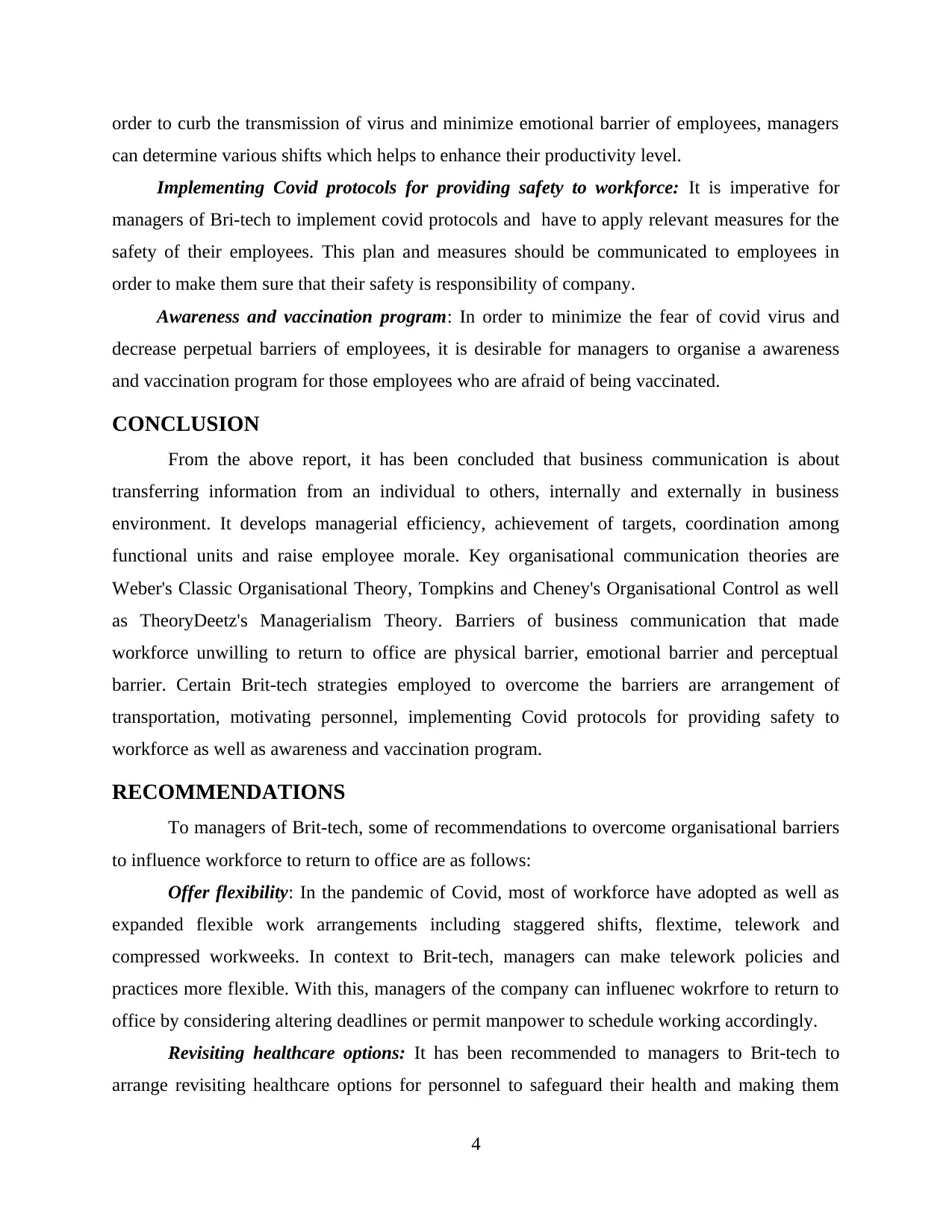
order to curb the transmission of virus and minimize emotional barrier of employees, managers
can determine various shifts which helps to enhance their productivity level.
Implementing Covid protocols for providing safety to workforce: It is imperative for
managers of Bri-tech to implement covid protocols and have to apply relevant measures for the
safety of their employees. This plan and measures should be communicated to employees in
order to make them sure that their safety is responsibility of company.
Awareness and vaccination program: In order to minimize the fear of covid virus and
decrease perpetual barriers of employees, it is desirable for managers to organise a awareness
and vaccination program for those employees who are afraid of being vaccinated.
CONCLUSION
From the above report, it has been concluded that business communication is about
transferring information from an individual to others, internally and externally in business
environment. It develops managerial efficiency, achievement of targets, coordination among
functional units and raise employee morale. Key organisational communication theories are
Weber's Classic Organisational Theory, Tompkins and Cheney's Organisational Control as well
as TheoryDeetz's Managerialism Theory. Barriers of business communication that made
workforce unwilling to return to office are physical barrier, emotional barrier and perceptual
barrier. Certain Brit-tech strategies employed to overcome the barriers are arrangement of
transportation, motivating personnel, implementing Covid protocols for providing safety to
workforce as well as awareness and vaccination program.
RECOMMENDATIONS
To managers of Brit-tech, some of recommendations to overcome organisational barriers
to influence workforce to return to office are as follows:
Offer flexibility: In the pandemic of Covid, most of workforce have adopted as well as
expanded flexible work arrangements including staggered shifts, flextime, telework and
compressed workweeks. In context to Brit-tech, managers can make telework policies and
practices more flexible. With this, managers of the company can influenec wokrfore to return to
office by considering altering deadlines or permit manpower to schedule working accordingly.
Revisiting healthcare options: It has been recommended to managers to Brit-tech to
arrange revisiting healthcare options for personnel to safeguard their health and making them
4
can determine various shifts which helps to enhance their productivity level.
Implementing Covid protocols for providing safety to workforce: It is imperative for
managers of Bri-tech to implement covid protocols and have to apply relevant measures for the
safety of their employees. This plan and measures should be communicated to employees in
order to make them sure that their safety is responsibility of company.
Awareness and vaccination program: In order to minimize the fear of covid virus and
decrease perpetual barriers of employees, it is desirable for managers to organise a awareness
and vaccination program for those employees who are afraid of being vaccinated.
CONCLUSION
From the above report, it has been concluded that business communication is about
transferring information from an individual to others, internally and externally in business
environment. It develops managerial efficiency, achievement of targets, coordination among
functional units and raise employee morale. Key organisational communication theories are
Weber's Classic Organisational Theory, Tompkins and Cheney's Organisational Control as well
as TheoryDeetz's Managerialism Theory. Barriers of business communication that made
workforce unwilling to return to office are physical barrier, emotional barrier and perceptual
barrier. Certain Brit-tech strategies employed to overcome the barriers are arrangement of
transportation, motivating personnel, implementing Covid protocols for providing safety to
workforce as well as awareness and vaccination program.
RECOMMENDATIONS
To managers of Brit-tech, some of recommendations to overcome organisational barriers
to influence workforce to return to office are as follows:
Offer flexibility: In the pandemic of Covid, most of workforce have adopted as well as
expanded flexible work arrangements including staggered shifts, flextime, telework and
compressed workweeks. In context to Brit-tech, managers can make telework policies and
practices more flexible. With this, managers of the company can influenec wokrfore to return to
office by considering altering deadlines or permit manpower to schedule working accordingly.
Revisiting healthcare options: It has been recommended to managers to Brit-tech to
arrange revisiting healthcare options for personnel to safeguard their health and making them
4
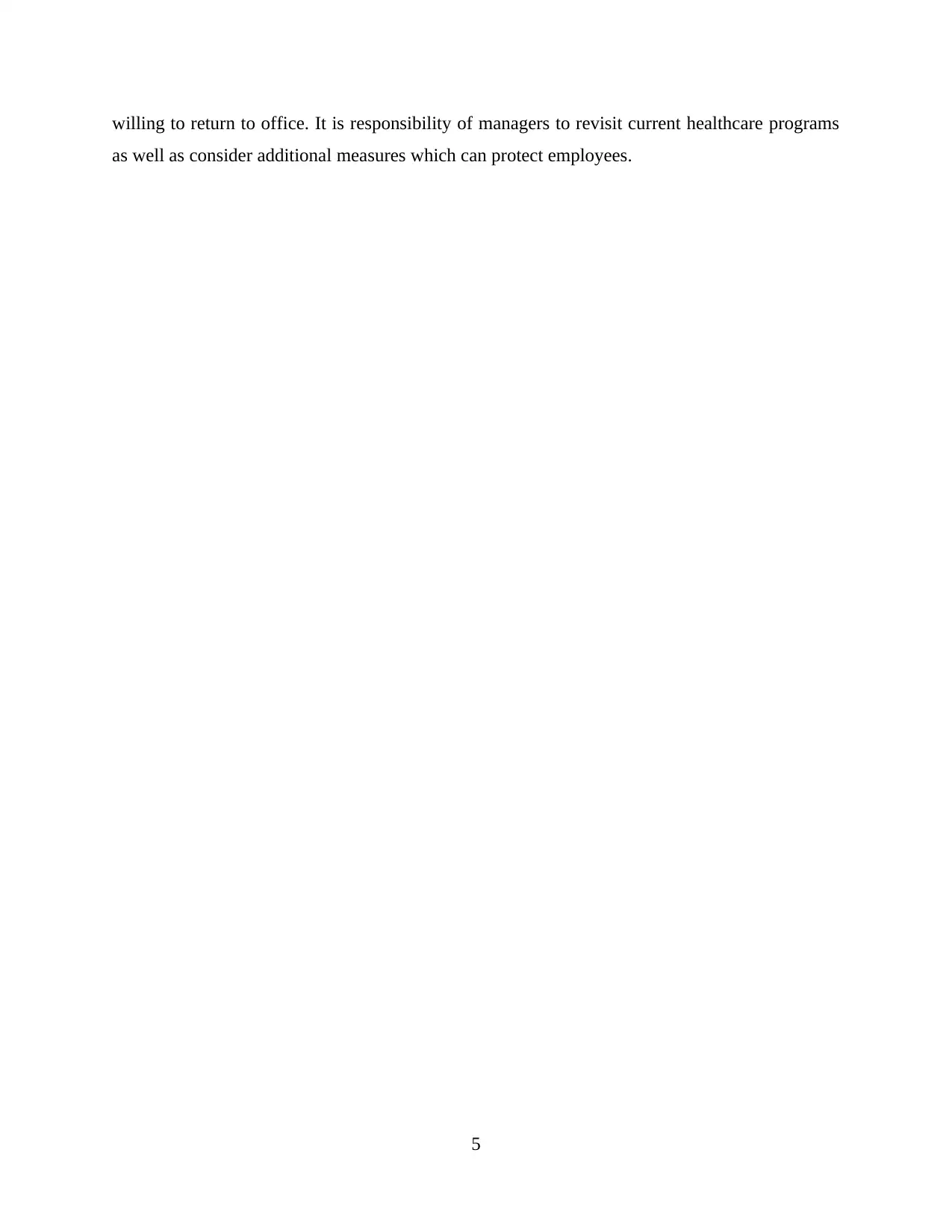
willing to return to office. It is responsibility of managers to revisit current healthcare programs
as well as consider additional measures which can protect employees.
5
as well as consider additional measures which can protect employees.
5
⊘ This is a preview!⊘
Do you want full access?
Subscribe today to unlock all pages.

Trusted by 1+ million students worldwide
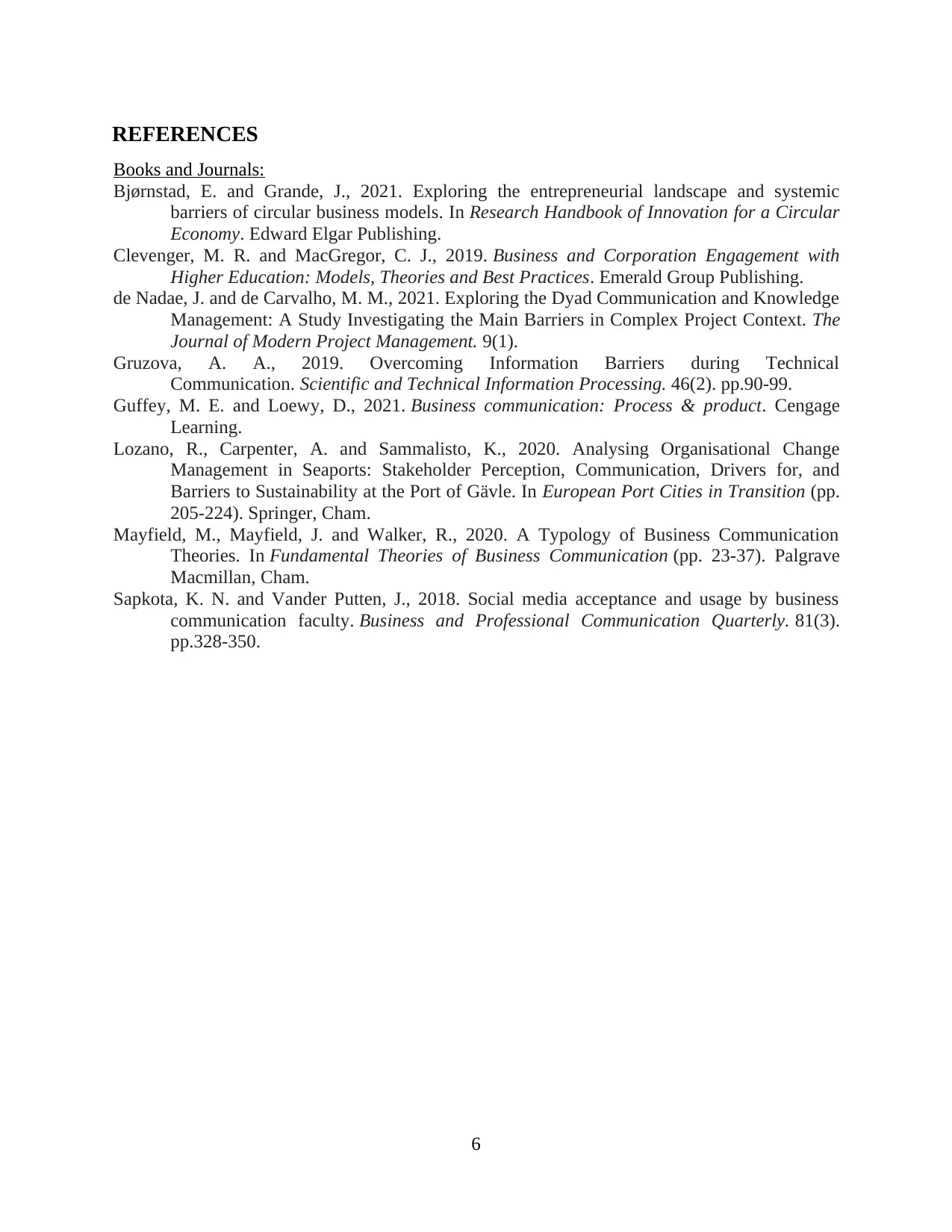
REFERENCES
Books and Journals:
Bjørnstad, E. and Grande, J., 2021. Exploring the entrepreneurial landscape and systemic
barriers of circular business models. In Research Handbook of Innovation for a Circular
Economy. Edward Elgar Publishing.
Clevenger, M. R. and MacGregor, C. J., 2019. Business and Corporation Engagement with
Higher Education: Models, Theories and Best Practices. Emerald Group Publishing.
de Nadae, J. and de Carvalho, M. M., 2021. Exploring the Dyad Communication and Knowledge
Management: A Study Investigating the Main Barriers in Complex Project Context. The
Journal of Modern Project Management. 9(1).
Gruzova, A. A., 2019. Overcoming Information Barriers during Technical
Communication. Scientific and Technical Information Processing. 46(2). pp.90-99.
Guffey, M. E. and Loewy, D., 2021. Business communication: Process & product. Cengage
Learning.
Lozano, R., Carpenter, A. and Sammalisto, K., 2020. Analysing Organisational Change
Management in Seaports: Stakeholder Perception, Communication, Drivers for, and
Barriers to Sustainability at the Port of Gävle. In European Port Cities in Transition (pp.
205-224). Springer, Cham.
Mayfield, M., Mayfield, J. and Walker, R., 2020. A Typology of Business Communication
Theories. In Fundamental Theories of Business Communication (pp. 23-37). Palgrave
Macmillan, Cham.
Sapkota, K. N. and Vander Putten, J., 2018. Social media acceptance and usage by business
communication faculty. Business and Professional Communication Quarterly. 81(3).
pp.328-350.
6
Books and Journals:
Bjørnstad, E. and Grande, J., 2021. Exploring the entrepreneurial landscape and systemic
barriers of circular business models. In Research Handbook of Innovation for a Circular
Economy. Edward Elgar Publishing.
Clevenger, M. R. and MacGregor, C. J., 2019. Business and Corporation Engagement with
Higher Education: Models, Theories and Best Practices. Emerald Group Publishing.
de Nadae, J. and de Carvalho, M. M., 2021. Exploring the Dyad Communication and Knowledge
Management: A Study Investigating the Main Barriers in Complex Project Context. The
Journal of Modern Project Management. 9(1).
Gruzova, A. A., 2019. Overcoming Information Barriers during Technical
Communication. Scientific and Technical Information Processing. 46(2). pp.90-99.
Guffey, M. E. and Loewy, D., 2021. Business communication: Process & product. Cengage
Learning.
Lozano, R., Carpenter, A. and Sammalisto, K., 2020. Analysing Organisational Change
Management in Seaports: Stakeholder Perception, Communication, Drivers for, and
Barriers to Sustainability at the Port of Gävle. In European Port Cities in Transition (pp.
205-224). Springer, Cham.
Mayfield, M., Mayfield, J. and Walker, R., 2020. A Typology of Business Communication
Theories. In Fundamental Theories of Business Communication (pp. 23-37). Palgrave
Macmillan, Cham.
Sapkota, K. N. and Vander Putten, J., 2018. Social media acceptance and usage by business
communication faculty. Business and Professional Communication Quarterly. 81(3).
pp.328-350.
6
1 out of 10
Related Documents
Your All-in-One AI-Powered Toolkit for Academic Success.
+13062052269
info@desklib.com
Available 24*7 on WhatsApp / Email
![[object Object]](/_next/static/media/star-bottom.7253800d.svg)
Unlock your academic potential
Copyright © 2020–2026 A2Z Services. All Rights Reserved. Developed and managed by ZUCOL.



